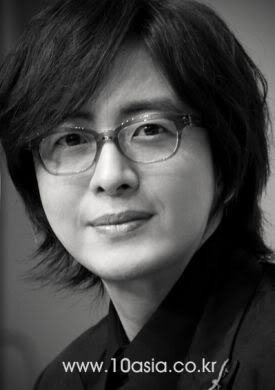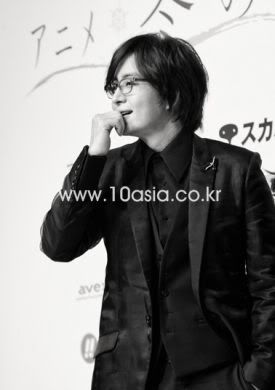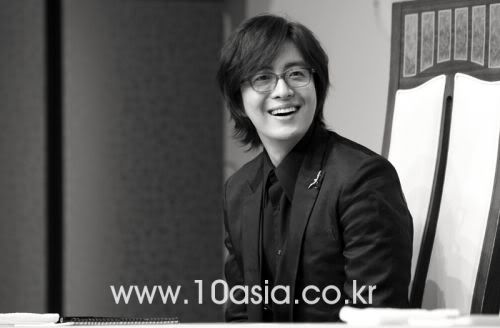Since some time ago, we started to think of Bae Yong-joon as a set face. During the two years after MBC TV series “The Story of the First King's Four Gods” aired, what reminded us of his presence were a few commercials and the frequent tourists who visited from across the ocean.
Therefore, the opportunity to have a conversation face-to-face with Bae Yong-joon, the guy with the exact same smile on panels in the streets of Myungdong, was all the more interesting and rare.
This is a record of the interview held after the event celebrating the publication of his photo essay "Discovering the Beauty of Korea" at Tokyo Dome on September 30. What was originally a short tea-time talk turned into an interview that lasted much longer than an hour.
The whole time, Bae created moments of "actual communication” -- those which cannot be written down but only expressed through either a smile, question, joke or a serious look. We hope this record becomes the first key to opening the door to the “human Bae Yong-joon” that we all thought we knew but, in fact, did not.
10: What I realized here in Japan is that your presence is so much greater than it is in Korea.
Bae: Honestly in Korea, (pointing to journalists) people here don’t give me the credit. (laugh) I think the public can only react to how the press makes them react. The reason I started to ask that the word “Hallyu” not be used is that I think it’s better to go in the direction where it seems we are exchanging our cultures rather than using a one-sided word like that. The articles written in Korea are all read and written in Japan also. So if we think a little more about what’s best for our country, and for ourselves, I think we'll be much happier.
10: But there seems to be some difference in your popularity in Korea and Japan.
10: But there seems to be some difference in your popularity in Korea and Japan.
Bae: You mean to say that I'm not popular in Korea, right? (laugh) But I have enough family [fans] in Korea too. In fact, I teared up because I felt so sorry and heartbroken for people who came to the Tokyo Dome event from Korea.
10: You wrote postcards for your fans at the Tokyo Dome event celebrating the publication of “Discovering”. Are such events your own ideas?
Bae: Yes, I can’t dance or sing for them even though my heart wants to because I don’t have the ability to deliver [my feelings] in such ways. And I can’t show them my acting. So the postcard was one of the tools I used to deliver my feelings and express my thoughts. I actually wanted to talk to them in Japanese, but when I got sick with a fever running as high as 40 degrees, I forgot everything I had studied.
10: Despite all that trouble you went through, did you feel a different sort of joy from writing compared to when you act or take pictures?
Bae: When I’m acting, there definitely are times that I really feel something is there, although it’s not very often. I think it’s the same with writing. There are times when I look at what I wrote and go, “Wow, how did I think up something like that?” (laugh)
10: Which part, for example?
Bae: The passage I recited at the Tokyo Dome event about the random thoughts that came to mind at Miruksa Temple. And the part where I wrote that the emotion of “human affection” is deeply penetrated into our food, clothing and shelter. I actually said to myself, “Wow, did I really think that!” (laugh) But I don’t think I'll be able to write another book in the future. It's so hard. That's why I said I'd focus on photographs if I publish another book but it's also because with this book, I’m quite disappointed with the photos. I took the photos first and wrote later while working on the book. But when I started writing, I realized I needed certain photos. So I wrote down which photos I needed, but I stayed up night after night writing and couldn't go back to take those pictures.
10: You included a lot of photographs that you took yourself in the book but it's necessary to do a certain amount of studying to reach the level of becoming a photographer with professionalism.
Bae: The technical aspect of photography isn't actually that difficult. What I feel is important, is the sensibility. I use the camera to take pictures, but it’s my really heart and not my fingers that press down on the shutter. When my heart allows that moment to be captured, that brief moment is when I click on the shutter so I think sensibility is more important than technique. And I don’t do much digital work. I use film because when I use a digital camera (pointing to a photographer in front of him), I press away on the shutter like that. Thinking that one of them would turn out alright. (laugh)
10: You usually don’t really expose yourself but in the book, there are many pictures of you joking and goofing around with people.
10: You usually don’t really expose yourself but in the book, there are many pictures of you joking and goofing around with people.
Bae: I could never write this book without exposing myself. I’m not a professional writer, so I couldn't make that stuff up. So who I am on the inside came out just as it is. After I had stayed up all night, I would send a text message to my staff and colleagues saying, “I’m going to sleep now. Feel like throwing up.” Or sometimes I would just text, “Barf!” (laugh)
Editor in Chief : Beck Una one@10asia.co.kr
Reporter : Choi Ji-Eun five@10asia.co.kr
Photographer : Lee Jin-hyuk eleven@10asia.co.kr
Editor : Lynn Kim lynn2878@asiae.co.kr, Lee Ji-Hye seven@10asia.co.kr




No comments:
Post a Comment